Vasily Koledov, investor in emerging markets, business and science editor for BRIC Plus Magazine and our chair for this event, posed a very real scenario: ‘Let’s imagine you want to make money in an emerging market where you currently do not have presence. So you put together a strong market entry plan, hire a workforce, invest in new facilities and …. nothing happens – or at least your sales go way below forecast. A good example is HSBC who entered several emerging markets with a bang, only to pull out a few years later, firing over 400 employees.’
What do you do?
BRIC House had a think tank session with top media, finance and business executives with companies in emerging markets and asked them what are the key factors necessary for a business to be successful in an emerging market.
The overwhelming consensus was that understanding the culture of a market you are entering is just as important as business strategy and here is their advice for how to do it:
1. Become an anthropologist
Knowing and understanding the policies, barriers to entry and government regulations are all very important but understanding the local people and their culture is, as firmly stated by Joseph Farodoye co-founder of Africa Property Invest, ‘the difference between success and failure; making a deal and losing a deal.’
One great recommendation came from Zachary Latif, Partner at TLG, ‘relocate to an emerging market – take a few months to be an anthropologist, to understand local culture, understand their ways and mentality and therefore build various expectation models of what they can and cannot achieve.’
According to HSBC risk and compliance analyst Sadie Samuels, the side effects of not doing so are drastic: ‘without understanding the culture you are doomed because you are already putting yourself at a disadvantage if you don’t try and understand how they operate as people.’
2. Invest in educating your team
‘Cultural sensitivity and cultural adaptation is what makes or breaks a person’s tenure’ in an emerging market was a point made by Zachary Latif and agreed on by all, and this sensitivity should not only come from the CEO but from every member of staff involved.
Sadie Samuels, who knows all about the importance of team cohesion, could not stress this point more: ‘There cannot be a weak link where someone doesn’t know, they need to understand their role, how relevant it is in the country of the emerging market that they are in and it needs to cascade regularly with updates and training.’
Customer service and communication is all about the little things. Joseph Farodoye meets with hugely influential African movers and shakers in the property, politics and business spheres daily and advises that ‘it is important that your team really understands the language and even the colloquialisms used in a particular market.’

3. Be the bridge, not the competition
There is a common misconception that the biggest barrier to entry for a foreign business in an emerging market is that you will be seen as a threat by local businesses. However, Adel Darwish, noted author, reporter and broadcaster, makes an extremely valid point: ‘if you are a successful business you are bringing in a product or service that the market needs so you would not be considered a threat’. There will, of course be local competition, but it is down to you to decide how you are perceived by the local community. ‘They should see you as an extension or as someone they can do business with. If you actually bridge that gap and reach an agreement with the local producers so they do not see you as a threat that is the most important part of doing business in emerging markets.’
4. PR Strategy: Ingenuity
What media platform is the best for targeting investors or High-Net-Worth individuals from emerging markets? Adel Darwish says ‘I would say print will always be stronger than electronic media. Your target reader will most likely be at a Harley street dentist or waiting at a private jet terminal and is likely to pick up a magazine while they wait.’
So partnering with an influential luxury magazine if a good idea – but how do you choose the right one? Sadie Samuels gives the answer: ‘you need someone that understands the business, the local policies and practices; they have to understand the countries where you do business. So as a PR agency I would actually use BRIC Plus Magazine.’
Joseph Farodoye suggests using ‘a small to medium sized agency as they would be more hungry and have their ears to the ground, and when it comes to emerging markets you really have to be part of that environment in order to have the right kind of effect.
5. Use local business ambassadors
No matter what company you are trying to set up it is more than likely that you will need a business ambassadors. Zachary Latif breaks the necessary attributes down: ‘the ideal ambassador is somebody who has very strong local links, either in business or politics, for instance our ambassador in Uganda was recently voted as Africa’s top business man of the year. Type A personalities are people that want to get ahead but at the same time are very good networkers – somebody who is able to go all the way from the president to the kitchen staff and know half the country along the way. In a lot of emerging markets, even though the population sizes are huge, the sphere of influence is very small so if you’re in it you are in it and if you’re out of it you are out of it. So you need somebody who is able to weave into that sphere of influence.’
6. Add value!
Social corporate responsibility is a buzz phrase for doing business in emerging markets. Joseph Farodoye explains that ‘a lot of people look to emerging markets just to make money, but you have to also give back – it is extremely important to actually add value to an economy and take a certain amount of social responsibility for being present there.’
Vasily Koledov ends the discussion by talking about the future.‘The BRIC region will by the end of this year surpass the US in GDP. Their middle class is growing to about 2 billion people by 2030. At the same time this increase of consumer demand is not being met by foreign entrance, hence it presents a very lucrative and exciting opportunity for people to capture that market.’
The emerging markets are a massive entrepreneurial community and the untapped opportunities are endless. But remember these key points before you dive in!

Click below to view the video in full







